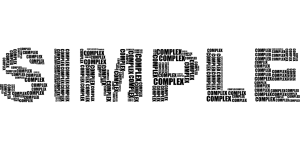Tip 1: Use plain words
 The plain language movement is growing. According to the International Plain Language Federation, “A communication is in plain language if its wording, structure, and design are so clear that the intended readers can easily find what they need, understand what they find, and use that information.”
The plain language movement is growing. According to the International Plain Language Federation, “A communication is in plain language if its wording, structure, and design are so clear that the intended readers can easily find what they need, understand what they find, and use that information.”
Poor communication is expensive. Readers take longer to understand the texts, and they may need to call you for an explanation. They could make an error filling out a form, and then you need to restart the process. What’s more, as you have already learned, a poorly written text is also more difficult to translate. In contrast, if a text is well written, more people will be able to understand and act on your message quickly and appropriately—in one or more languages.
One of the main ways to write plainly is to choose common or everyday words—plain words—over their less common or more obscure equivalents. This strategy is beneficial when your text might be translated using an automatic translator. As explained previously, current systems use a data-driven approach, where the tool learns by looking at examples. Rare or obscure words are less likely to appear in the training corpus, whereas everyday words will be plentiful. This means that the automatic translation tool will be more familiar with the everyday words and will have a better chance of translating them correctly.
Find out more
- The Language Portal of Canada and the Our Languages blog contain numerous resources and links to help you learn more about plain language.
- If you want to have some fun, why not try the quizzes Weed your words and Weed your words again offered by the Language Portal of Canada?
- You can also use the free online app Hemingway, a plain language checker that works a bit like a grammar checker, to obtain suggestions about how to write more plainly.
Try it!

